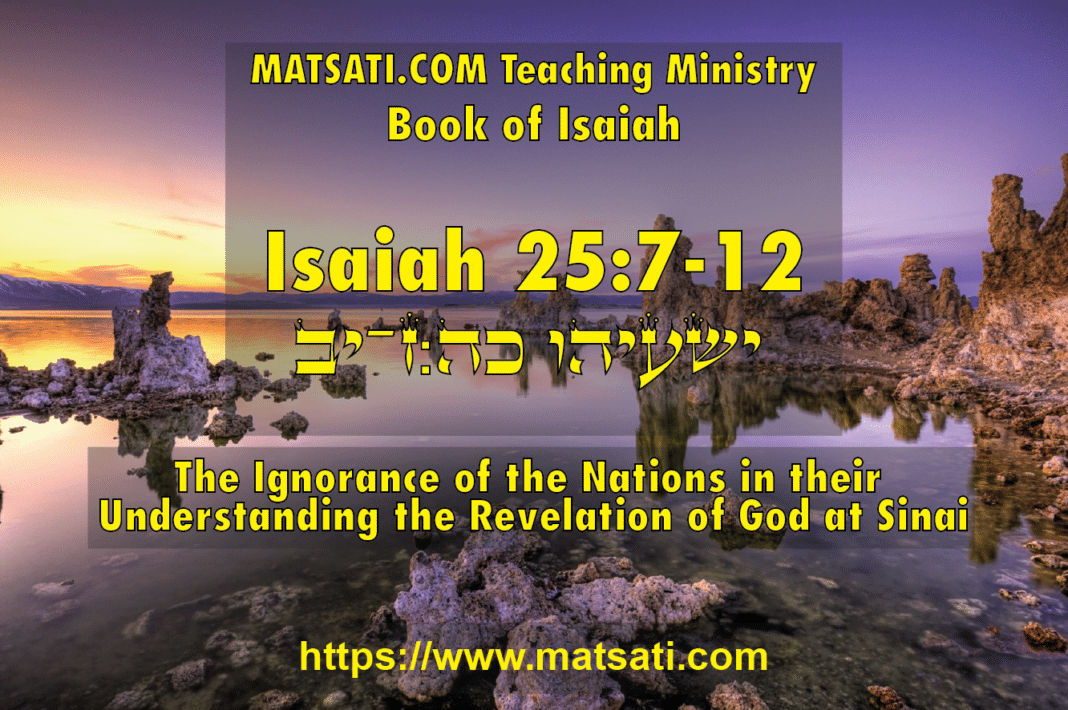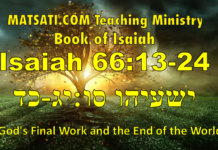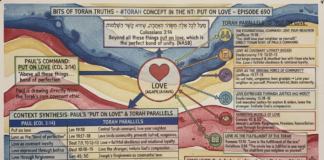Isaiah 25:7-12
It is interesting here in Isaiah 25:6-8 we read how attention goes to a banquet, of song, and of how the Lord will swallow up death in victory and wipe away tears from all faces. When a king is crowned as king, there is a great banquet that is held and here Isaiah describes how the King’s subjects come from far and wide. This is consistent with the prophetic message that Isaiah gave in Isaiah 2:1-5, that all peoples will flow to the mountain of the Lord (Isaiah 24:23, 2:2-3, 4:5, 11:9, 65:25). There are a lot of NT concepts here in these two verses where the Lord God ends the destruction of death and removes the sorrows which accompany the destruction. This new banquet seems to bring with it life; this parallels the message of John’s gospel according to John 4:13-14, 6:35, 6:58, and 7:37-38. Isaiah 25:8 in fact is used frequently in the NT text:
PARALLEL PASSAGES
Isaiah Tanakh Quotes in the New Testament
- Isaiah 25:8 || 1 Corinthians 15:54 || Revelation 7:17 || Revelation 21:4
- Psalms 23:1 || Psalms 23:2 || Isaiah 25:8 || Isaiah 49:10 || Jeremiah 2:13 || Ezekiel 34:23 || Revelation 7:17
- Isaiah 25:8 || Isaiah 35:10 || Isaiah 65:19 || Revelation 21:4
The NT use of the Tanakh is a topic in NT Studies where scholars study why the authors quoted various passages. It is an important issue within the study of the interpretation of the Bible, especially in the area of messianic prophecies concerning Yeshua. Note that the fourth edition of the United Bible Societies’ Greek Testament (1993) lists 343 quotations from Tanakh in the NT, as well as no fewer than 2,309 allusions and verbal parallels. The books most used are Tehillim / Psalms (79 quotations, 333 allusions), and Isaiah (66 quotations, 348 allusions). The authors of the NT used passages from the Tanakh for many different reasons, some of which were for apologetic, moral, and doctrinal reasons. This demonstrates the relevance of the Tanakh for us today, and functions as a foundation stone upon which the NT text rests. These things again are reasons why it is so important for us to study the Tanakh (OT) text. This is how Paul understood the position of the Tanakh when he says that everything that “was written in former days was written for our instruction, that through endurance and through the encouragement of the Scriptures we might have hope” (Romans 15:4).
The proper understanding, interpretation, study, and exposition of Scripture may only be found in the hermeneutical technique used by the rabbis in the rabbinic literature and New Testament period which is rooted in the Second Temple Period and the multi-faceted methods of interpretation developed by the Jewish people. Hillel the Elder developed seven distinct techniques for exposition that could be used to understand and apply the Scriptures in everyday life. We note that these principles are used throughout the NT text, examples are shown below. These rules of exegesis are as follows:
The Seven Principles of Biblical Interpretation
| Principle 1 | קל וחומר – Kal vachomer (“light and heavy”): The argument from a minor premise to a major one. Example of Principle 1 |
| Principle 2 | גזרה שוה – Gezerah Shavah (“cut equally”): The teaching based upon an analogy or inference from one verse to another. Example of Principle 2 |
| Principle 3 | בנין אב מכתוב אחד – Binyan av mikatuv echad (“building a teaching principle based upon one verse”): The main proposition is derived from one verse. Example of Principle 3 |
| Principle 4 | בנין אב משני כתובים – Binyan av mishnai katuvim (“building a teaching principle based upon two verses”): The main proposition is derived from two verses. Example of Principle 4 |
| Principle 5 | כלל ופרט ומפרט וכלל – Kelal uferat-perat vekelal (“general and specific–specific and general”): Teaching from a general principle to a specific one, or from a specific principle to a general one. Example of Principle 5 |
| Principle 6 | כיוצא בו במקום אחר – Keyotza bo bamakom acher (“as comes from it in another place”): A teaching based upon what is similar in another passage. Example of Principle 6 |
| Principle 7 | דבר הלמד מענינו – Devar halamed meinyano (“a word that is learned from its own issue”): A matter that is learned from its own subject. Example of Principle 7 |
These seven principles may be seen in different passages of the various midrashim which are an exposition on the biblical text seeking the deeper meaning and practical application of the Bible by using highly developed exegetical techniques. Yeshua Himself used a method of interpretation which intensified the deeper meaning of Torah. Note that later, Rabbi Ishmael expanded Hillel’s seven principles to thirteen; then Rabbi Eleazer enlarged the scope of hermeneutical principles to include thirty-two applications (not listed). The standard approach we take on the interpretation of the Scriptures is the rabbinic method of interpretation known as פַּרְדֵ״ס pardes:
PARDES (Heb. פַּרְדֵ״ס), the word pardes was used as a pneumonic for the four types of biblical exegesis, an acronym for the following words:
- פשת – Peshat (“the simple, literal historical narrative meaning”)
- רמז – Remez (“hint,” i.e., veiled allusions such as gematria, etc)
- דרש – Drash (“homiletical interpretation”)
- סוד – Sod (“mystery,” i.e., the esoteric interpretation)
For example, Midrash comes from the Hebrew word darash, meaning “search.” This is a Jewish commentary which searches the biblical text for clarification beyond the obvious, the Peshat. In other words, midrash is a method which involves commentary on a specific passage of the Bible. We note that the NT text is both a historical document which documents the life of Yeshua and the early days of the church and disciples. The NT text is also a midrash on the Tanakh. The rabbis would use midrash to search the sacred text and provide an updated scriptural teaching to make it relevant to new circumstances and issues. One of the best examples in the NT is John 6:25-59 which comments on Shemot / Exodus 16:4, Tehillim / Psalm 78:24 (compare John 6:31). Yeshua’s words are considered by some scholars as a running “commentary” on this passage found in the book of Exodus. After the discovery of the Dead Sea Scrolls (DSS), scholars concluded that these and other writings found were from a community called Qumran. The community was a group of people who were isolationists, who had split off from the Temple service in Jerusalem, believing it to have been corrupted. Qumran serves as an example of the method of pesher, for at Qumran “scripture was viewed as containing mysteries in need of explanation. The ‘pesher’ was the explanation of the mystery,” this usually involved the prophetic text. NT examples include Acts 2:17-21 citing Joel 2:28-32, and Mark 12:10-11 citing Tehillim / Psalms 118:22-23 (compare Ephesians 3:4-6). Some NT authors used allegory in their usage of the Tanakh. Caution is due, in that this method is the least common, yet its place and presence in the NT should still be noted. Allegorical interpretation typically involves a symbolic meaning found within a text. The idea is that there is to some degree, a deeper meaning that is beneath the obvious letter of the passage. The best known first-century allegorist was Philo of Alexandria. However, the most obvious example in the NT can be found in Paul’s letters such as in Galatians 4:24-31. In this usage, Sarah and Hagar symbolize two covenants. It should be noted that Yeshua’s parables are not allegories although they do sometimes contain allegorical features (compare Mark 12:1-9).
With all of these things in mind, let’s look at Isaiah 25:7-8.
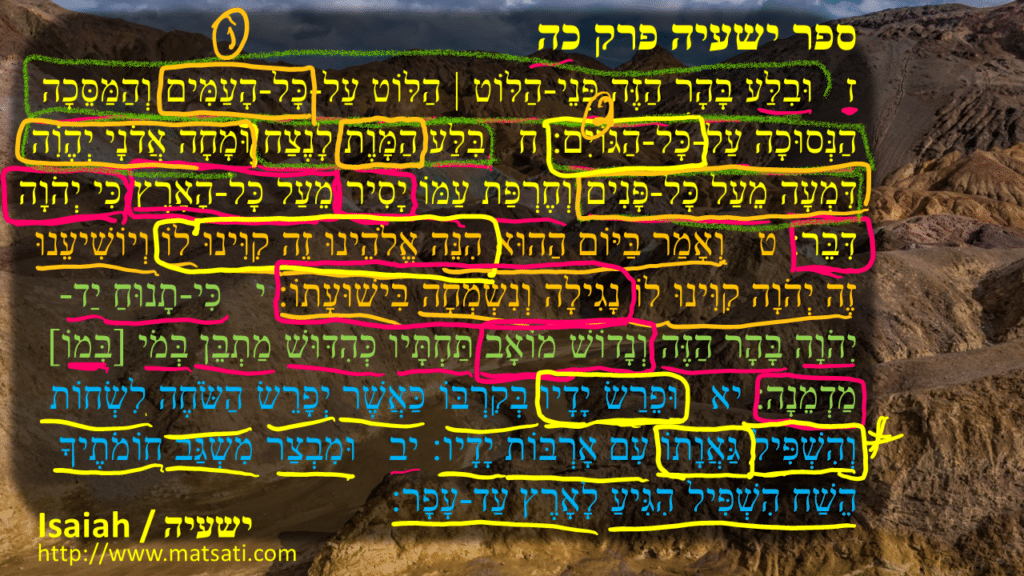
ספר ישעיה פרק כה
ז וּבִלַּע בָּהָר הַזֶּה פְּנֵי-הַלּוֹט | הַלּוֹט עַל-כָּל-הָעַמִּים וְהַמַּסֵּכָה הַנְּסוּכָה עַל-כָּל-הַגּוֹיִם: ח בִּלַּע הַמָּוֶת לָנֶצַח וּמָחָה אֲדֹנָי יְהֶוִֹה דִּמְעָה מֵעַל כָּל-פָּנִים וְחֶרְפַּת עַמּוֹ יָסִיר מֵעַל כָּל-הָאָרֶץ כִּי יְהֹוָה דִּבֵּר:
Isaiah 25:7 states, “And he will destroy in this mountain the face of the covering cast over all people, and the vail that is spread over all nations. (וּבִלַּע בָּהָר הַזֶּה פְּנֵי-הַלּוֹט | הַלּוֹט עַל-כָּל-הָעַמִּים וְהַמַּסֵּכָה הַנְּסוּכָה עַל-כָּל-הַגּוֹיִם)” Isaiah 25:8 “He will swallow up death in victory; and the Lord GOD will wipe away tears from off all faces; (בִּלַּע הַמָּוֶת לָנֶצַח וּמָחָה אֲדֹנָי יְהֶוִֹה דִּמְעָה מֵעַל כָּל-פָּנִים) and the rebuke of his people shall he take away from off all the earth: for the LORD hath spoken it. (וְחֶרְפַּת עַמּוֹ יָסִיר מֵעַל כָּל-הָאָרֶץ כִּי יְהֹוָה דִּבֵּר)” These verses have so many allusions in the NT text, it is difficult to due these verses justice in exposition here in the study. One example of a NT allusion may be taken from 2 Corinthians 3:13-18. Here Paul speaks, providing an example of the hardness of the heart coupled with the example of the vail that Moshe covered his face with.
2 Corinthians 3:13–18
3:13 And not as Moses, which put a vail over his face, that the children of Israel could not steadfastly look to the end of that which is abolished: 3:14 But their minds were blinded: for until this day remaineth the same vail untaken away in the reading of the old testament; which vail is done away in Christ. 3:15 But even unto this day, when Moses is read, the vail is upon their heart. 3:16 Nevertheless when it shall turn to the Lord, the vail shall be taken away. 3:17 Now the Lord is that Spirit: and where the Spirit of the Lord is, there is liberty. 3:18 But we all, with open face beholding as in a glass the glory of the Lord, are changed into the same image from glory to glory, even as by the Spirit of the Lord. (KJV, ܘܠܴܐ ܐܱܝܟ݂ ܡܽܘܫܶܐ ܂ ܕ݁ܪܴܡܶܐ ܗ̄ܘܳܐ ܬܱ݁ܚܦܻ݁ܝܬ݂ܴܐ ܥܰܠ ܐܱܦܱ݁ܘܗ̄ܝ̈ ܆ ܕ݁ܠܴܐ ܢܚܽܘܪܾܘܢ ܒ݁ܢܱ̈ܝ ܐܻܝܣܪܴܝܶܠ ܒ݁ܫܽܘܠܴܡܶܗ ܕ݁ܗܰܘ ܕ݁ܡܶܬ݂ܒܱ݁ܛܱܠ ܂ܐܷܠܴܐ ܐܷܬ݂ܥܰܘܰܪܘ ܒ݁ܡܰܕ݁ܥܰܝ̈ܗܽܘܢ ܂ ܥܕ݂ܰܡܳܐ ܓܷ݁ܝܪ ܠܝܰܘܡܳܢܳܐ ܇ ܐܷܡܰܬ݂ܝ ܕ݁ܕ݂ܺܝܰܬ݂ܻܩܺܐ ܥܰܬܻ݁ܝܩܬܴ݁ܐ ܡܶܬ݂ܩܰܪܝܳܐ ܆ ܗܺܝ ܗܳܝ ܬܱ݁ܚܦܻ݁ܝܬ݂ܴܐ ܩܳܝܡܳܐ ܥܠܱܝܗܽܘܢ ܂ ܘܠܴܐ ܡܶܬ݂ܓܱ݁ܠܝܳܐ ܂ ܕ݁ܒ݂ܰܡܫܺܝܚܳܐ ܗܽܘ ܡܶܬ݂ܒܱ݁ܛܠܴܐ ܂ ܘܰܥܕ݂ܰܡܳܐ ܠܝܰܘܡܳܢܳܐ ܇ ܐܷܡܰܬ݂ܝ ܕ݁ܡܶܬ݂ܩܪܷܐ ܡܽܘܫܶܐ ܆ ܬܱ݁ܚܦܻ݁ܝܬ݂ܴܐ ܥܰܠ ܠܷܒ݁ܗܽܘܢ ܪܱܡܝܳܐ ܂ ܘܶܐܡܰܬ݂ܝ ܕ݁ܐ̱ܢܳܫ ܡܶܢܗܽܘܢ ܢܶܬ݂ܦ݁ܢܶܐ ܠܘܳܬ݂ ܡܳܪܝܳܐ ܆ ܡܶܫܬܱ݁ܩܠܴܐ ܡܶܢܶܗ ܬܱ݁ܚܦܻ݁ܝܬ݂ܴܐ ܂ ܡܳܪܝܳܐ ܕܷ݁ܝܢ ܗܽܘܝܽܘ ܪܾܘܚܳܐ ܆ ܘܰܐܬ݂ܱܪ ܕ݁ܪܾܘܚܶܗ ܕ݁ܡܳܪܝܳܐ ܂ ܚܺܐܪܾܘܬ݂ܴܐ ܗ̄ܝ ܂ ܚܢܰܢ ܕܷ݁ܝܢ ܟܾ݁ܠܱܢ ܒܱ݁ܐܦܷ̈݁ܐ ܓܱ݁ܠܝܴ̈ܬ݂ܴܐ ܆ ܬܷ݁ܫܒܾ݁ܘܚܬܷ݁ܗ ܕ݁ܡܳܪܝܳܐ ܐܱܝܟ݂ ܕܱ݁ܒ݂ܡܰܚܙܺܝܬ݂ܴܐ ܚܳܙܶܝܢܰܢ ܂ ܘܠܴܗ ܠܱܕ݂ܡܽܘܬ݂ܴܐ ܡܶܫܬܱ݁ܚܠܦ݂ܺܝܢܰܢ ܇ ܡܶܢ ܫܽܘܒ݂ܚܳܐ ܠܫܽܘܒ݂ܚܳܐ ܇ ܐܱܝܟ݂ ܕ݁ܡܶܢ ܡܳܪܝܳܐ ܪܾܘܚܳܐ ܀ 13 καὶ οὐ καθάπερ Μωϋσῆς ἐτίθει κάλυμμα ἐπὶ τὸ πρόσωπον ⸀αὐτοῦ πρὸς τὸ μὴ ἀτενίσαι τοὺς υἱοὺς Ἰσραὴλ εἰς τὸ ⸁τέλος τοῦ καταργουμένου*. 14 ἀλλʼ ἐπωρώθη τὰ νοήματα αὐτῶν*. ἄχρι γὰρ τῆς σήμερον °ἡμέρας τὸ αὐτὸ κάλυμμα ἐπὶ τῇ ἀναγνώσει τῆς παλαιᾶς διαθήκης μένει*, μὴ ἀνακαλυπτόμενον ὅτι ἐν Χριστῷ καταργεῖται·* 15 ἀλλʼ ἕως σήμερον ἡνίκα ⸂ἂν ἀναγινώσκηται⸃ Μωϋσῆς, κάλυμμα ἐπὶ τὴν καρδίαν αὐτῶν κεῖται·* 16 ἡνίκα δὲ ἐὰν ἐπιστρέψῃ πρὸς κύριον, περιαιρεῖται τὸ κάλυμμα*. 17 ὁ δὲ κύριος τὸ πνεῦμά ἐστιν· οὗ δὲ τὸ πνεῦμα ⸀κυρίου, ⸆ ἐλευθερία*. 18 ἡμεῖς δὲ °πάντες ἀνακεκαλυμμένῳ προσώπῳ τὴν δόξαν κυρίου ⸀κατοπτριζόμενοι τὴν αὐτὴν εἰκόνα ⸁μεταμορφούμεθα ἀπὸ δόξης εἰς δόξαν ⸀καθάπερ ἀπὸ κυρίου πνεύματος*)
We note something about the Torah, generally speaking, the Torah is greatly misunderstood even today in the majority of Christianity. Theologies such as dispensationalism teach that man earned his salvation before God through obedience to the mitzvot (commands) under the Mosaic Covenant. The major point of the Exodus story was to demonstrate how God delivered Israel, brought her out of Egypt with a mighty hand, and brought her before Mount Sinai, He brought her through the sea, fed her with mana and meat, and brought water from a stone, God provided many miracles prior to bringing her before His holy mountain. Then by word of mouth, the people entered into a covenant with God because of His mercy and grace. Then, and only then, after entering into a covenant did God give Israel His holy Word, his Torah instructions for living their lives as the people of God! The actual narrative in the Torah throws the theology of dispensationalism on its head!
The Isaiah text states, וּבִלַּע בָּהָר הַזֶּה פְּנֵי-הַלּוֹט | הַלּוֹט עַל-כָּל-הָעַמִּים וְהַמַּסֵּכָה הַנְּסוּכָה עַל-כָּל-הַגּוֹיִם “And he will destroy in this mountain the face of the covering cast over all people, and the vail that is spread over all nations” providing the context of the nations as opposed to Israel, and for this reason Isaiah may be talking about the ignorance of the nations in their understanding the revelation of God at Sinai. Verse 8 describes how death is swallowed up, and so the “veil” spoken of here refers to death, the idea of preventing faith and faithfulness as God desires for all peoples. We note that without faith, faithfulness, and repentance there is no salvation. We are being told here there will be a day when the Lord will remove this veil and provide a way for all peoples to have faith. This provides a messianic expectation, in relation to faith and faithfulness. In Isaiah 25:8 “He will swallow up death in victory; and the Lord GOD will wipe away tears from off all faces; and the rebuke of his people shall he take away from off all the earth: for the LORD hath spoken it.” (בִּלַּע הַמָּוֶת לָנֶצַח וּמָחָה אֲדֹנָי יְהֶוִֹה דִּמְעָה מֵעַל כָּל-פָּנִים וְחֶרְפַּת עַמּוֹ יָסִיר מֵעַל כָּל-הָאָרֶץ כִּי יְהֹוָה דִּבֵּר) we are reminded of Yeshua’s death and resurrection, where we are told in Him death has been defeated once and for all, for all the peoples of the earth (Romans 6:14, 1 Corinthians 15:12-57, 1 Thessalonians 4:14, Revelation 1:17-18, 21:4). These verses speak of the Biblical grand finale on the outcome of the history of the interactions of God with men. Deliverance from the curse of death and may be a reference to the expectation of immortality for those who have faith and trust in the Lord. This idea of destroying death forever, it is interesting how death or the underworld is often pictured as the swallower of life. The word הַמָּוֶת “the death,” the Canaanite religion has a deity named “Death” (Mot) who is feared by both gods and humans for his power having an inescapable and insatiable appetite. (John D. Barry et al., Faithlife Study Bible (Bellingham, WA: Lexham Press, 2012, 2016) In the Hebrew Bible mavet/mot often refers to the realm of death and occasionally refers to death personified. There is a fluidity in the biblical texts between Mot and Sheol as both a person and a locality. Scholars vary as to how prevalent the personification of Mot was in the Hebrew Bible. On one extreme some scholars (e.g., Smick 1980: 497) argue that Mot “was not mentioned in the OT” (cf. Kaufmann 1960: 311–16), while on the other extreme Mot has been read into almost every mention of death. (Theodore J. Lewis, “Mot (Deity),” ed. David Noel Freedman, The Anchor Yale Bible Dictionary, New York: Doubleday, 1992, 923) Theodore Lewis goes on saying the following:
At Ugarit, Mot is a decidedly more personal being, portrayed as the archenemy of Baal. The degree to which Ugaritic Mot is seen behind biblical texts will continue to be debated. Yet the personification of Death in the Hebrew Bible is too prevalent and enduring to be regarded merely as a poetic metaphor or literary device. In ancient Israel, Death was considered to be a real person. At the same time, however, in the religion which becomes normative HaShemmust absorb all aspects of divinity. Just as he takes on the attributes of other Canaanite deities such as El and Baal, so too he takes on the attributes of Mot, although he is never called by this name. HaShem, by definition, must absorb any divine powers usually ascribed in the ANE to other deities (cf. Miller 1986: 242–44 who points out similarities with supreme national deities in Mesopotamia such as Marduk and Ashur). Thus the God of the Hebrew Bible has “terrors” (biʿûtı̂m, Job 6:4) corresponding to those of Mot, who is called in Job 18:13 “the king of terrors” (melek ballāhôt; Pope Job AB, 135–36; Habel Job OTL, 287–88). Compare also the “breakers” of HaShem in Ps 42:8 (Eng 42:7) with the “breakers” of Death in 2 Sam 22:5—Eng 22:4 (cf. Ps 35:5; 50:22). HaShem also has a chthonian entourage which makes up his cosmic army: “Before him marched Plague (Deber), Pestilence (Rešep) followed close behind” (Hab 3:5; cf. Deut 32:24; Ps 78:48). Yet in the final analysis, in the eschatological battle described in Isa 25:8, HaShem swallows up Mot forever (neṣaḥ). As Gropp has aptly noted, this once-and-for-all victory “contrasts strikingly with the periodic struggle between Baal and Mot, growing out of an agriculturally based religion. Further, Baal’s dominion never extends completely to the realm of Mot. HaShem’s dominion, on the other hand, is quite absolute.” (see Theodore J. Lewis, “Mot (Deity),” ed. David Noel Freedman, The Anchor Yale Bible Dictionary (New York: Doubleday, 1992), 924.)
Our God, HaShem, the Lord God Almighty in heaven, is the Creator, the giver of Life, this is how God is introduced in the Torah from the very beginning! This whole concept of God swallowing up death is consistent with the Torah’s description of the Living God who is the giver of life! In addition to this, the Lord overpowering the false gods of the nations, especially this god of death in the Greek (Hades) and Canaanite (Mot) religions provides us with the great hope of our God who is the giver of life! The phrase וּמָחָ֨ה אֲדֹנָ֧י יְהוִ֛ה דִּמְעָ֖ה מֵעַ֣ל כָּל־פָּנִ֑ים “and the Lord God will wipe tears from all faces” provides a description of the love of God for His people as a parent would nurture their children. Note that man cannot conquer death, but God can, and this is achieved through resurrection, as the NT text points out in the case of Yeshua the Messiah. The reproach on all the earth in relation to the curse of death will be removed, so many parallels even to the book of Revelation. The concept of the veil represents “stubborn faith” that one resists having faith, and the scripture says this will bring much shame. We note that salvation exists only through God’s people, this is the point of the Israel centric principle that we had discussed earlier. The NT text provides an eschatological teaching via Paul according to Romans 11:11-27.
Romans 11:11–28
11:11 I say then, Have they stumbled that they should fall? God forbid: but rather through their fall salvation is come unto the Gentiles, for to provoke them to jealousy. 11:12 Now if the fall of them be the riches of the world, and the diminishing of them the riches of the Gentiles; how much more their fullness? 11:13 For I speak to you Gentiles, inasmuch as I am the apostle of the Gentiles, I magnify mine office: 11:14 If by any means I may provoke to emulation them which are my flesh, and might save some of them. 11:15 For if the casting away of them be the reconciling of the world, what shall the receiving of them be, but life from the dead? 11:16 For if the firstfruit be holy, the lump is also holy: and if the root be holy, so are the branches. 11:17 And if some of the branches be broken off, and thou, being a wild olive tree, were grafted in among them, and with them partakest of the root and fatness of the olive tree; 11:18 Boast not against the branches. But if thou boast, thou bearest not the root, but the root thee. 11:19 Thou wilt say then, The branches were broken off, that I might be grafted in. 11:20 Well; because of unbelief they were broken off, and thou standest by faith. Be not high minded, but fear: 11:21 For if God spared not the natural branches, take heed lest he also spare not thee. 11:22 Behold therefore the goodness and severity of God: on them which fell, severity; but toward thee, goodness, if thou continue in his goodness: otherwise thou also shalt be cut off. 11:23 And they also, if they abide not still in unbelief, shall be grafted in: for God is able to graft them in again. 11:24 For if thou wert cut out of the olive tree which is wild by nature, and wert graffed contrary to nature into a good olive tree: how much more shall these, which be the natural branches, be grafted into their own olive tree? 11:25 For I would not, brethren, that ye should be ignorant of this mystery, lest ye should be wise in your own conceits; that blindness in part is happened to Israel, until the fullness of the Gentiles be come in. 11:26 And so all Israel shall be saved: as it is written, There shall come out of Sion the Deliverer, and shall turn away ungodliness from Jacob: 11:27 For this is my covenant unto them, when I shall take away their sins. 11:28 As concerning the gospel, they are enemies for your sakes: but as touching the election, they are beloved for the fathers’ sakes. (KJV)
We note how consistent Paul’s writings are with the Isaiah text here. The veil is in place for the purpose of drawing the non-Jewish person to faith in the God of Israel! Men, women, and children from all nations being turned to faith in the God of Israel!
In Isaiah 25:9-12 we read how Isaiah concludes this chapter with the victory that only God can provide, and the joy that results from the Lord God working such a great miracle. The idea is that in order to have a part with this final outcome with God being victorious, and we being on His side, is that one must respond to His divine invitation by faith. These things are a wakeup call, that we are not to be lulled asleep by this world and its activities (various forms of entertainment). Rather, we need to be actively seeking the Lord, and be concerned with how we live our lives for the glory of God! In this way we walk with God according to His word, because if we do not walk with God, we are walking away from Him, and that spells disaster in terms of the final outcome. The mercy of God reveals the softness of God’s heart, that allows a time for Teshuvah (repentance) and turning from sin, and turning towards the Lord God in heaven! Praise His holy name for the victory that only He can provide in our lives, to overcome sin, to walk in His holy ways, and to bear the testimony of His greatness in our lives, through miracles, deliverances, and love! The overarching conclusion is that these things are calling out to us to repent, and to turn to the Lord. Do so now while yet there is time, since when the time runs out there will only be regret for the decisions that were made in this life!
Isaiah goes on saying the following according to Isaiah 25:9.
ספר ישעיה פרק כה
ט וְאָמַר בַּיּוֹם הַהוּא הִנֵּה אֱלֹהֵינוּ זֶה קִוִּינוּ לוֹ וְיוֹשִׁיעֵנוּ זֶה יְהֹוָה קִוִּינוּ לוֹ נָגִילָה וְנִשְֹמְחָה בִּישׁוּעָתוֹ:
Isaiah 25:9 states, “And it shall be said in that day, Lo, this is our God; we have waited for him, and he will save us: (וְאָמַר בַּיּוֹם הַהוּא הִנֵּה אֱלֹהֵינוּ זֶה קִוִּינוּ לוֹ וְיוֹשִׁיעֵנוּ) this is the LORD; we have waited for him, we will be glad and rejoice in his salvation. (זֶה יְהֹוָה קִוִּינוּ לוֹ נָגִילָה וְנִשְֹמְחָה בִּישׁוּעָתוֹ)” Here is a statement of faith in the phrase הִנֵּה אֱלֹהֵינוּ זֶה קִוִּינוּ לוֹ “behold this is the Lord we hope for Him.” We note how the people trusted in God; their hope was in Him. This is how the psalmist wrote according to Tehillim / Psalms 39:8-9 (Eng 7-8).
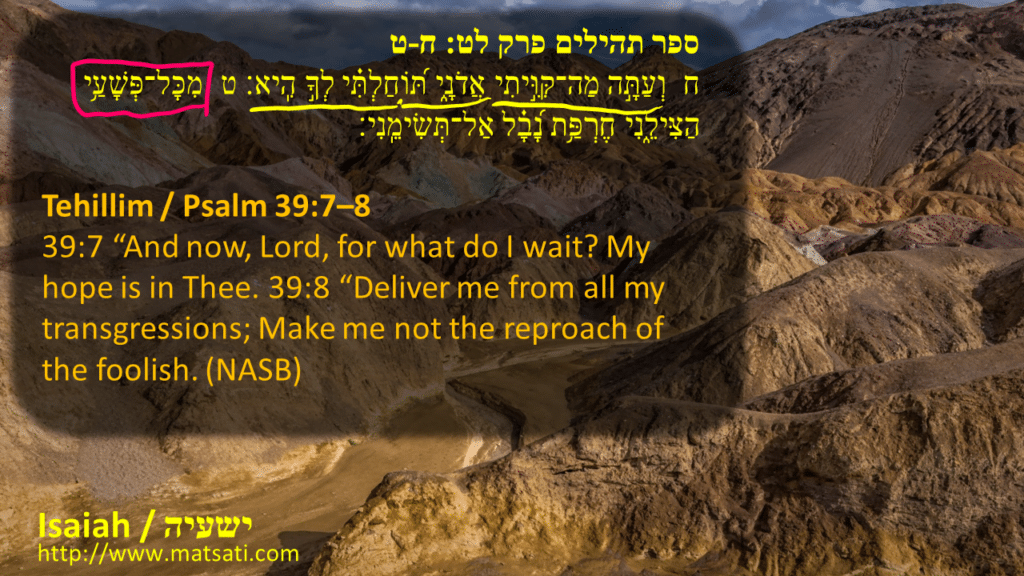
ספר תהילים פרק לט: ח-ט
ח וְעַתָּ֣ה מַה־קִּוִּ֣יתִי אֲדֹנָ֑י תּ֝וֹחַלְתִּ֗י לְךָ֣ הִֽיא׃ ט מִכָּל־פְּשָׁעַ֥י הַצִּילֵ֑נִי חֶרְפַּ֥ת נָ֝בָ֗ל אַל־תְּשִׂימֵֽנִי׃
Tehillim / Psalm 39:7–8
39:7 “And now, Lord, for what do I wait? My hope is in Thee. 39:8 “Deliver me from all my transgressions; Make me not the reproach of the foolish. (NASB)
Here David was the psalmist, he sought the Lord for the purpose of being delivered from his transgressions (פְּשָׁעַ֥י). The significant point here is the assistance of God for the removal of transgressions. David places his trust and hope in the Lord, seeking the Lord to deliver him from his transgressions. This is why faith in Yeshua is so important for us since His sacrifice was made and His blood was poured out in the heavenly tabernacle for the purpose of atoning for our sins, totally removing our transgressions. Why does David ask the Lord to deliver him from his transgressions? The reason being was based on what he wrote in the previous psalm, Tehillim / Psalms 38:3-5 (Eng 38:4-16).
ספר תהילים פרק לח
ד אֵין-מְתֹם בִּבְשָֹרִי מִפְּנֵי זַעְמֶךָ אֵין-שָׁלוֹם בַּעֲצָמַי מִפְּנֵי חַטָּאתִי: ה כִּי-עֲוֹנֹתַי עָבְרוּ רֹאשִׁי כְּמַשָּׂא כָבֵד יִכְבְּדוּ מִמֶּנִּי: ו הִבְאִישׁוּ נָמַקּוּ חַבּוּרֹתָי מִפְּנֵי אִוַּלְתִּי: ז נַעֲוֵיתִי שַׁחֹתִי עַד-מְאֹד כָּל-הַיּוֹם קֹדֵר הִלָּכְתִּי: ח כִּי-כְסָלַי מָלְאוּ נִקְלֶה וְאֵין מְתֹם בִּבְשָֹרִי: ט נְפוּגֹתִי וְנִדְכֵּיתִי עַד-מְאֹד שָׁאַגְתִּי מִנַּהֲמַת לִבִּי: י אֲדֹנָי נֶגְדְּךָ כָל-תַּאֲוָתִי וְאַנְחָתִי מִמְּךָ לֹא-נִסְתָּרָה: יא לִבִּי סְחַרְחַר עֲזָבַנִי כֹחִי וְאוֹר עֵינַי גַּם-הֵם אֵין אִתִּי: יב אֹהֲבַי | וְרֵעַי מִנֶּגֶד נִגְעִי יַעֲמֹדוּ וּקְרוֹבַי מֵרָחֹק עָמָדוּ: יג וַיְנַקְשׁוּ | מְבַקְשֵׁי נַפְשִׁי וְדֹרְשֵׁי רָעָתִי דִּבְּרוּ הַוּוֹת וּמִרְמוֹת כָּל-הַיּוֹם יֶהְגּוּ: יד וַאֲנִי כְחֵרֵשׁ לֹא אֶשְׁמָע וּכְאִלֵּם לֹא יִפְתַּח-פִּיו: טו וָאֱהִי כְּאִישׁ אֲשֶׁר לֹא-שֹׁמֵעַ וְאֵין בְּפִיו תּוֹכָחוֹת: טז כִּי-לְךָ יְהֹוָה הוֹחָלְתִּי אַתָּה תַעֲנֶה אֲדֹנָי אֱלֹהָי::
Tehillim / Psalms 38:3-15
38:3 There is no soundness in my flesh because of thine anger; neither is there any rest in my bones because of my sin. 38:4 For mine iniquities are gone over mine head: as an heavy burden they are too heavy for me. 38:5 My wounds stink and are corrupt because of my foolishness. 38:6 I am troubled; I am bowed down greatly; I go mourning all the day long. 38:7 For my loins are filled with a loathsome disease: and there is no soundness in my flesh. 38:8 I am feeble and sore broken: I have roared by reason of the disquietness of my heart. 38:9 Lord, all my desire is before thee; and my groaning is not hid from thee. 38:10 My heart panteth, my strength faileth me: as for the light of mine eyes, it also is gone from me. 38:11 My lovers and my friends stand aloof from my sore; and my kinsmen stand afar off. 38:12 They also that seek after my life lay snares for me: and they that seek my hurt speak mischievous things, and imagine deceits all the day long. 38:13 But I, as a deaf man, heard not; and I was as a dumb man that openeth not his mouth. 38:14 Thus I was as a man that heareth not, and in whose mouth are no reproofs. 38:15 For in thee, O LORD, do I hope: thou wilt hear, O Lord my God. (KJV)
Note what Daivd is saying here, the heavy burden of sin, how sin corrupts, it stinks, how his iniquity that is in his body causes him to mourn all day long, and that there is no soundness in his flesh. This is how he describes his sins bringing troubles and sorrows to his life (Tehillim / Psalms 38:3-57). David’s faith and belief helps us to understand that when our transgressions are forgiven, the sorrows of the flesh will be removed! He says that he needs delivering (הַצִּילֵנִי) from all his crime (מִכָּל-פְּשָׁעַי), the reason being that he does not want to be disgraced (חֶרְפַּת) by the foolishness of sin! We note that the record that God has given us in the Scriptures, helps us to have hope and patience to wait upon the Lord! The Lord God has continuously shown Himself to be faithful to His people, and so we are given these things in the Scriptures so that we can remain faithful and patiently wait upon the Lord. Isaiah said that the people’s response was נָגִילָה וְנִשְֹמְחָה בִּישׁוּעָתוֹ “we will shout in exaltation and be glad in His salvation.” Notice when we read Hebrew, we see Yeshua everywhere in the Tanakh as for example here in our text from Isaiah 25:9.
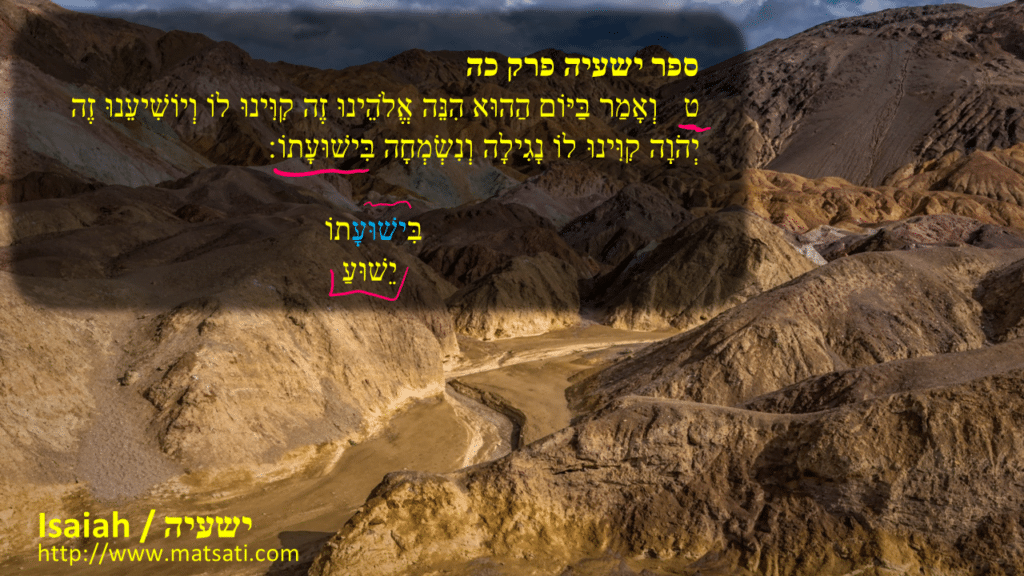
בִּישׁוּעָתוֹ
יֵשׁוּעַ
The salvation of God is a promise to us who believe! We read throughout the scriptures again and again (Bereshit / Genesis 17:8, Shemot / Exodus 29:45, Jeremiah 31:33, Ezekiel 37:27) the desire of God as it is stated according to Shemot / Exodus 29:45-46, מה וְשָׁ֣כַנְתִּ֔י בְּת֖וֹךְ בְּנֵ֣י יִשְׂרָאֵ֑ל וְהָיִ֥יתִי לָהֶ֖ם לֵאלֹהִֽים׃ מו וְיָדְע֗וּ כִּ֣י אֲנִ֤י יְהוָה֙ אֱלֹ֣הֵיהֶ֔ם אֲשֶׁ֨ר הוֹצֵ֧אתִי אֹתָ֛ם מֵאֶ֥רֶץ מִצְרַ֖יִם לְשָׁכְנִ֣י בְתוֹכָ֑ם אֲנִ֖י יְהוָ֥ה אֱלֹהֵיהֶֽם׃ “and I will dwell in the midst of the children of Israel and I will be to them God. And they will know they I the Lord their God that brought them from the land of Egypt to dwell in their midst, I the Lord their God.” We note how this is coupled with God’s salvation, and how this was not exclusive to the exodus narrative only, this Torah-centric principle is a fundamental principle of the Messiah Himself! Yeshua’s words speak to this according to John 14:16-17.
John 14:16–17
14:16 “And I will ask the Father, and He will give you another Helper, that He may be with you forever; 14:17 that is the Spirit of truth, whom the world cannot receive, because it does not behold Him or know Him, but you know Him because He abides with you, and will be in you. (NASB, ܐܴܡܰܪ ܠܷܗ ܝܶܫܽܘܥ ܂ ܓܱ݁ܒ݂ܪܴܐ ܚܰܕ݂ ܥܒ݂ܰܕ݂ ܐܱܚܫܳܡܺܝܬ݂ܴܐ ܪܱܒ݁ܬ݂ܴܐ ܂ ܘܰܩܪܴܐ ܠܣܰܓܻ݁ܝܷ̈ܐܐ ܂ ܘܫܰܕܱ݁ܪ ܥܰܒ݂ܕܷ݁ܗ ܒ݁ܥܶܕܴ݁ܢܳܐ ܕܱ݁ܐܚܫܳܡܺܝܬ݂ܴܐ ܁ ܕ݁ܢܺܐܡܰܪ ܠܱܐܝܠܷܝܢ ܕܱ݁ܩܪܷܝܢ ܆ ܗܳܐ ܟܾ݁ܠܡܶܕܷ݁ܡ ܡܛܱܝܰܒ݂ ܠܟ݂ܽܘܢ ܂ ܬܱ݁ܘ ܂16 κἀγὼ ἐρωτήσω τὸν πατέρα καὶ ἄλλον παράκλητον δώσει ὑμῖν,* ἵνα ⸂μεθʼ ὑμῶν εἰς τὸν αἰῶνα ᾖ⸃, 17 τὸ πνεῦμα τῆς ἀληθείας,* ὃ ὁ κόσμος οὐ δύναται λαβεῖν, ὅτι οὐ θεωρεῖ ⸀αὐτὸ οὐδὲ γινώσκει⸆· ὑμεῖς ⸇ γινώσκετε ⸁αὐτό, ὅτι παρʼ ὑμῖν ⸀1μένει καὶ ἐν ὑμῖν ⸀2ἔσται.)
Notice how Yeshua says “that the Father would be with you forever” (ἵνα ⸂μεθʼ ὑμῶν εἰς τὸν αἰῶνα ᾖ⸃). This is the Torah principle of God dwelling in our midst. It is by faith we receive the Holy Spirit of God, which is His presence in our midst. The great joy the people have being described here in Isaiah is that of knowing the sovereignty of God and the certainty that only He can save them! Yeshua says because God is in our midst, we will know these things to be true without doubt.
Isaiah goes on saying the following according to Isaiah 25:10.
ספר ישעיה פרק כה
י כִּי-תָנוּחַ יַד-יְהֹוָה בָּהָר הַזֶּה וְנָדוֹשׁ מוֹאָב תַּחְתָּיו כְּהִדּוּשׁ מַתְבֵּן בְּמֹי [בְּמוֹ] מַדְמֵנָה:
Isaiah 25:10 states, “For in this mountain shall the hand of the LORD rest, and Moab shall be trodden down under him, even as straw is trodden down for the dunghill. (כִּי-תָנוּחַ יַד-יְהֹוָה בָּהָר הַזֶּה וְנָדוֹשׁ מוֹאָב תַּחְתָּיו כְּהִדּוּשׁ מַתְבֵּן בְּמֹי [בְּמוֹ] מַדְמֵנָה)” Here Isaiah mentions Moab, and it may be due to Moab taunting Judah and Jerusalem to doubt their trust in the Lord deceiving the people to worship the god of Moab, Chemosh. The name Chemosh may stem from the words kamosh or kamashu, meaning “conqueror” or “subduer” as a verbal adjective of this stem. As a verb, it can mean “to bend down” or “to bow down.” Chemosh is the national deity of the Moabites. The Hebrew Bible connects Chemosh with the Moabites (Bamidbar / Numbers 21:29, 1 Kings 11:7, 11:33, 2 Kings 23:13, Jeremiah 48:7, 48:13, 48:46), except for Judges 11:24, where Chemosh is said to be the god of the Amorites. Worship of Chemosh was allowed in Israel under King Solomon, who built high places for Chemosh and Molech (1 Kings 11:7). These high places were likely among those torn down during Josiah’s reforms in the seventh century BC (2 Kings 23:13). Chemosh may also be involved in 2 Kings 3:26–27, which narrates Mesha’s (king of Moab) sacrifice of his eldest son, though the account does not identify which deity was offered the sacrifice. After Mesha’s sacrifice, “great wrath” came upon Israel, such that they departed from Moab and returned to Israel (2 Kings 3:27). (Logos Factbook) Note that the worship of Chemosh involved the human sacrifice of children, where they would literally broil babies alive. This great sin of the nation of Moab, the hand of the Lord, will strike Moab as we see here in Isaiah 25:10. We note something here too by this text from Isaiah, the point is to trust in the Lord God of Israel! Those who commit themselves to God in patience and trusting in Him will experience His hand of blessing. The Scriptures say that He will shade His people from the oppressive heat of the sun (Isaiah 49:2, Ezra 8:22, 8:31). And those who exalt themselves against God in their own self-sufficiency will eventually be crushed under that hand (Isaiah 25:11-12, 16:6, Jeremiah 48:29, Zephaniah 2:10). God’s love leads to deliverance for those who trust in Him, and His judgment comes to those who arrogantly reject Him and His holy ways!
Isaiah continues saying the following according to Isaiah 25:11-12.
ספר ישעיה פרק כה
יא וּפֵרַשֹ יָדָיו בְּקִרְבּוֹ כַּאֲשֶׁר יְפָרֵשֹ הַשֹּׂחֶה לִשְֹחוֹת וְהִשְׁפִּיל גַּאֲוָתוֹ עִם אָרְבּוֹת יָדָיו: יב וּמִבְצַר מִשְֹגַּב חוֹמֹתֶיךָ הֵשַׁח הִשְׁפִּיל הִגִּיעַ לָאָרֶץ עַד-עָפָר:
Isaiah 25:11 states, “And he shall spread forth his hands in the midst of them, as he that swimmeth spreadeth forth his hands to swim: and he shall bring down their pride together with the spoils of their hands. (וּפֵרַשֹ יָדָיו בְּקִרְבּוֹ כַּאֲשֶׁר יְפָרֵשֹ הַשֹּׂחֶה לִשְֹחוֹת וְהִשְׁפִּיל גַּאֲוָתוֹ עִם אָרְבּוֹת יָדָיו)” Isaiah 25:12 “And the fortress of the high fort of thy walls shall he bring down, lay low, and bring to the ground, even to the dust. (וּמִבְצַר מִשְֹגַּב חוֹמֹתֶיךָ הֵשַׁח הִשְׁפִּיל הִגִּיעַ לָאָרֶץ עַד-עָפָר)” The word גַּאֲוָתוֹ (his pride) is the pride of Moab the Lord God brought down and laid low. Here is the final outcome of those who reject the God of Israel resting in their own pride. Moab was geographically located in the plateau east of the Dead Sea and south of the Arnon River.
Note this shows the path Israel took in conquering the kings Sihon and Og of Moab. Bereshit / Genesis 19:30-38 describes the origins of Moab, stating that when Lot became intoxicated, his daughters seduced him. Each of them conceived a child, from which two Transjordanian states were born: Moab and Ammon. The mentions of Moab in the Scriptures are found here:
- The kings Sihon and Og were defeated in Moab. (Bamidbar / Numbers 21:22-24, Devarim / Deuteronomy 2:26-28)
- Balaam attempted to curse Israel on the order of Balak, king of Moab (Bamidbar / Numbers 21:21-35, 22:1-24:25).
- Moses read the Torah to the people and transferred leadership from himself to Joshua on the plains of Moab.
- David entrusted his parents to the king of Moab while he dealt with Saul’s hostility (1 Samuel 22:3-4).
- Solomon took wives from Moab and implemented practices involving their god, Chemosh, which cost him his kingdom (1 Kings 11:1, 11:7, 11:33).
- The first chapter of Ruth took place in Moab, and one of the primary messages of the book is that the genealogical line of King David is through Ruth the Moabitess.
- The poetic and prophetic genres treat Moab as an enemy along with other neighboring states (Tehillim / Psalms 60:8,https://www.matsati.com/index.php/tehillim-psalms-60-part-2-the-unworthy-man/ Isaiah 15-16, Jeremiah 48).
There are a few other records in the Tanakh that have an extended narrative related to Israelite-Moabite relations. Judges 3:12-31 recounts the oppression of the Israelites under Eglon, king of Moab, and depicts the tension between these two entities at that time. This tension may have carried over from their interactions on the east side of the Jordan River prior to the Israelites’ entry into Canaan. 2 Kings 3:1-27 describes the international relations between Judah, Israel, Edom, and Moab in the ninth century BC. We note וְהִשְׁפִּיל גַּאֲוָתוֹ “and will bring down his pride” again draws us back to the primary motive behind refusing to seek the God of Israel. Pride seeks to save oneself in spite of struggles. This leads to much uncertainty in life! When we trust in the Lord, we have a great resource for faith, and hope, found in the pages of the Holy Scriptures!
Rabbinic Literature
The Targum Jonathan is a Aramaic and Rabbinic translation of the book of Isaiah and is therefore a valuable resource for the study of Isaiah.
תרגום יונתן בן עוזיאל אל ישעיה פרק כה:ז-יב
ז וְיִסתַלעְמוּן בְטוּרָא הָדֵין אַפֵי רַבָא דַרָב עַל כָל עַמְמַיָא וְאַפֵי מַלכָא דְשַלִיט עַל כָל מַלכְוָתָא׃ ח יִתנְשֹון מֹותָא לְעָלְמִין וְיִמחֵי יוי אְלֹהִים דִמעְתָא מֵעַל כָל אַפַיָא וְחִסוּדֵי עַמֵיה יַעדֵי מֵעַל כָל אַרעָא אְרֵי בְמֵימְרָא דַיוי גְזִיר כֵין׃ ט וְיֵימַר בְעִדָנָא הַהוּא הָא אְלָהַנָא דֵין דְסַבַרנָא לֵיה וְיִפרְקִינַנָא דֵין יוי דַהְוֵינָא מְסַבְרִין לְמֵימְרֵיה נְבוּעַ וְנִחדֵי בְפוּרקָנֵיה׃ י אְרֵי תִתגְלֵי גְבוּרְתָא דַיוי בְטוּרָא הָדֵין וְיִתְדָשוּן מֹואְבָאֵי בְאַתרְהֹון כְמָא דְמִתְדָש תִבנָא בְטִינָא׃ יא וְיַפרֵיש מַחַת גְבוּרְתֵיה בֵינֵיהֹון כְמָא דִמפָרֵיש שַייָטָא לִמשָט וְיַמאֵיך יְקַרֵיה עִם אָשְוָת יְדֹוהִי׃ יב וּכרַך תְקֹוף כַרכֵי עַמְמַיָא יְמַגַר יִרמֵי יִמטֵי לְאַרעָא עַד עַפרָא׃
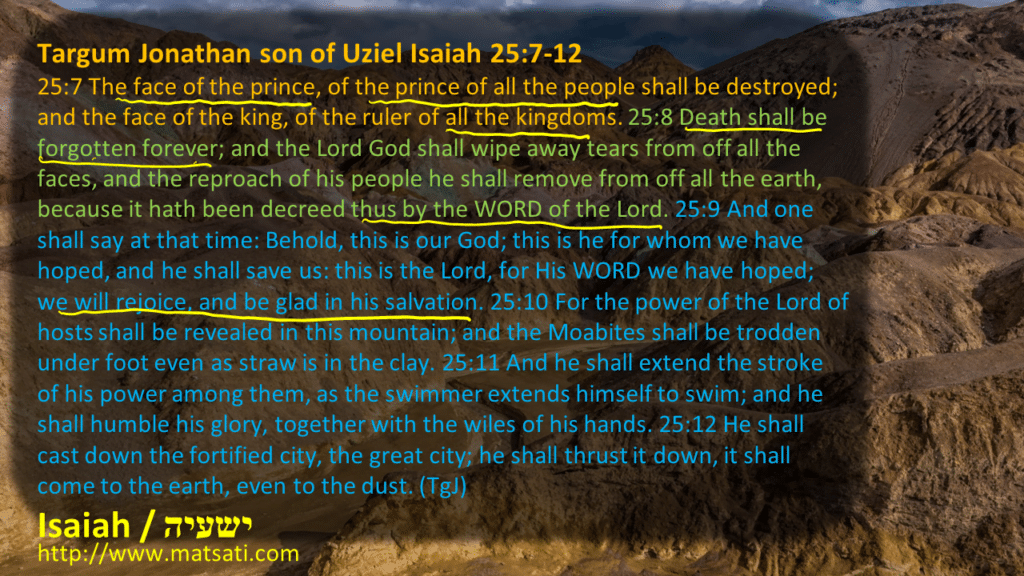
Targum Jonathan son of Uziel Isaiah 25:7-12
25:7 The face of the prince, of the prince of all the people shall be destroyed; and the face of the king, of the ruler of all the kingdoms. 25:8 Death shall be forgotten forever; and the Lord God shall wipe away tears from off all the faces, and the reproach of his people he shall remove from off all the earth, because it hath been decreed thus by the WORD of the Lord. 25:9 And one shall say at that time: Behold, this is our God; this is he for whom we have hoped, and he shall save us: this is the Lord, for His WORD we have hoped; we will rejoice, and be glad in his salvation. 25:10 For the power of the Lord of hosts shall be revealed in this mountain; and the Moabites shall be trodden under foot even as straw is in the clay. 25:11 And he shall extend the stroke of his power among them, as the swimmer extends himself to swim; and he shall humble his glory, together with the wiles of his hands. 25:12 He shall cast down the fortified city, the great city; he shall thrust it down, it shall come to the earth, even to the dust. (TgJ)
The TgJ reinterprets Isaiah 25:7 to say, ז וְיִסתַלעְמוּן בְטוּרָא הָדֵין אַפֵי רַבָא דַרָב עַל כָל עַמְמַיָא וְאַפֵי מַלכָא דְשַלִיט עַל כָל מַלכְוָתָא׃ 25:7 The face of the prince, of the prince of all the people shall be destroyed; and the face of the king, of the ruler of all the kingdoms. (TgJ) speaking of the prince of all the peoples. Searching for a correlation in the Tanakh for “prince of all the peoples,” turns up Daniel 9:26 through the hermeneutical principle of גזרה שוה – Gezerah Shavah.
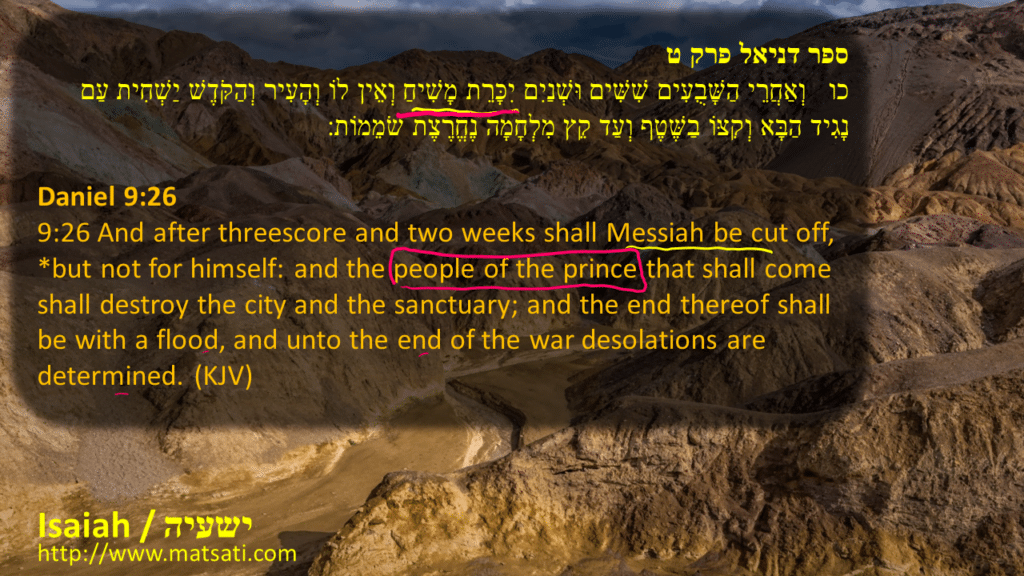
ספר דניאל פרק ט
כו וְאַחֲרֵי הַשָּׁבֻעִים שִׁשִּׁים וּשְׁנַיִם יִכָּרֵת מָשִׁיחַ וְאֵין לוֹ וְהָעִיר וְהַקֹּדֶשׁ יַשְׁחִית עַם נָגִיד הַבָּא וְקִצּוֹ בַשֶּׁטֶף וְעַד קֵץ מִלְחָמָה נֶחֱרֶצֶת שֹׁמֵמוֹת:
Daniel 9:26
9:26 And after threescore and two weeks shall Messiah be cut off, *but not for himself: and the people of the prince that shall come shall destroy the city and the sanctuary; and the end thereof shall be with a flood, and unto the end of the war desolations are determined. (KJV)
This concept of גזרה שוה – Gezerah Shavah very appropriately connects Isaiah 24:8 to this prophetic text from Daniel concerning the sanctuary, the people, and the Messiah. We note when we quickly look at the LXX Greek on this verse we read the following.
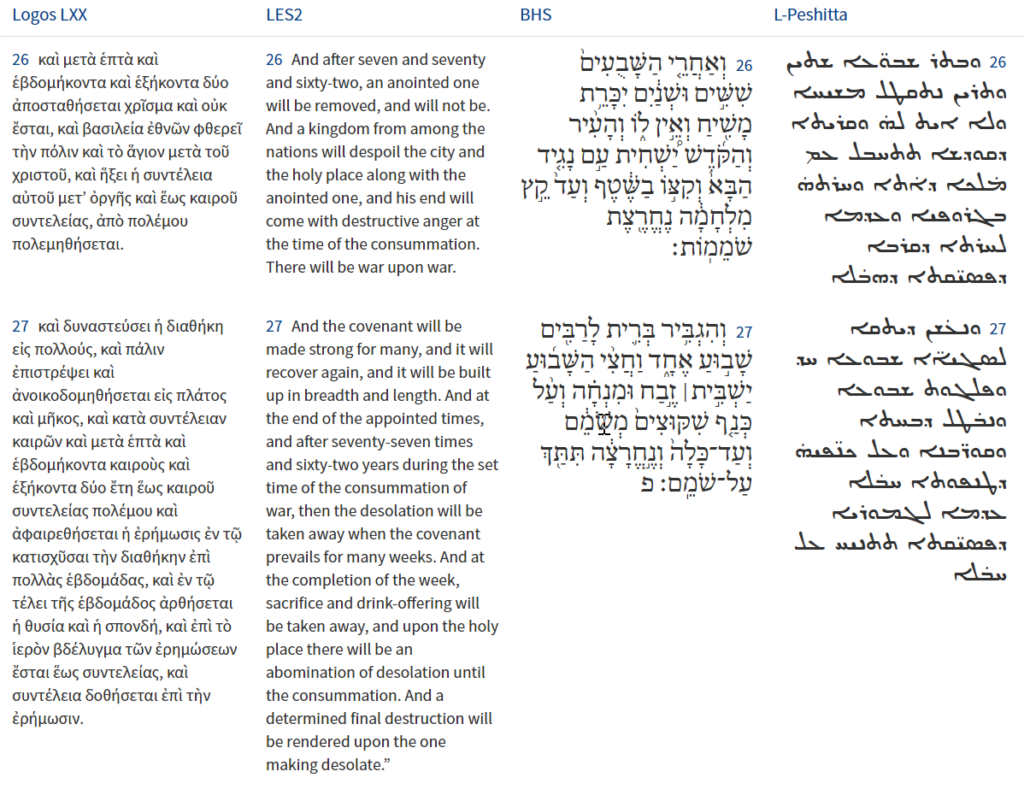
The Greek translation on Daniel 9:26-27 speaks to the very same thing that is taking place here in Isaiah 24-25. Daniel 9:26 states “And after threescore and two weeks shall Messiah be cut off, *but not for himself: and the people of the prince that shall come shall destroy the city and the sanctuary; and the end thereof shall be with a flood, and unto the end of the war desolations are determined.” (KJV) The LXX translates יִכָּרֵת מָשִׁיחַ as ἀποσταθήσεται χρῖσμα saying the same thing, “the Messiah will be cut off” shortly before the prince of the people comes (עַם נָגִיד הַבָּא). We note that יִכָּרֵת to be cut off, from the Torah perspective, means that one is being totally separated to the point of being killed (death). The example from the Neviim section of the Tanakh, Jeremiah 11:19, וַאֲנִ֕י כְּכֶ֥בֶשׂ אַלּ֖וּף יוּבַ֣ל לִטְב֑וֹחַ וְלֹֽא־יָדַ֜עְתִּי כִּֽי־עָלַ֣י׀ חָשְׁב֣וּ מַחֲשָׁב֗וֹת נַשְׁחִ֨יתָה עֵ֤ץ בְּלַחְמוֹ֙ וְנִכְרְתֶ֙נּוּ֙ מֵאֶ֣רֶץ חַיִּ֔ים וּשְׁמ֖וֹ לֹֽא־יִזָּכֵ֥ר עֽוֹד׃ 11:19 But I was like a lamb or an ox that is brought to the slaughter; and I knew not that they had devised devices against me, saying, Let us destroy the tree with the fruit thereof, and let us cut him off from the land of the living, that his name may be no more remembered. (KJV) Here Jeremiah speaks to the people say וְנִכְרְתֶ֙נּוּ֙ מֵאֶ֣רֶץ חַיִּ֔ים “let us cut him off from the land of the living.” The entire context of being cut off is spelled out here. So, what this text speaks of is to the future expectation of the work of the Messiah, and of His being cut off. This parallels the NT record of Yeshua the Messiah. We read that by oppression and judgment He was taken away and for His generation, who considered that He was cut out of the land of the living, for the transgression of my people to whom the stroke was due. (Isaiah 53:8) These things provide the proof texts for what Yeshua did on our behalf, and Isaiah leaves no doubt as to whom this was! According to Daniel 9:26, the Messiah will be cut off. The point of Daniel 9:26 was looking forward to the time when Yeshua was here on earth, and not some further future event. This is what Paul believed when he wrote in Romans 6:9 saying “…knowing that Christ, having been raised from the dead, is never to die again; death no longer is master of Him.” (9 εἰδότες ὅτι Χριστὸς ἐγερθεὶς ἐκ νεκρῶν οὐκέτι ἀποθνῄσκει, θάνατος αὐτοῦ οὐκέτι κυριεύει*.)
We note the עַם נָגִיד people of the prince, these are those who destroy the city Jerusalem and the Sanctuary. We note that shortly after Yeshau died (30 AD) that a Jewish revolt broke out under the reign of Nero and his Roman armies sent to crush those who revolted. This leaves the answer to who this prince is, as being Nero. The confirmation of the covenant is found in Daniel 9:27, the LXX writes, “27 And the covenant will be made strong for many, and it will recover again, and it will be built up in breadth and length. And at the end of the appointed times, and after seventy-seven times and sixty-two years during the set time of the consummation of war, then the desolation will be taken away when the covenant prevails for many weeks. And at the completion of the week, sacrifice and drink-offering will be taken away, and upon the holy place there will be an abomination of desolation until the consummation. And a determined final destruction will be rendered upon the one making desolate.” (καὶ δυναστεύσει ἡ διαθήκη εἰς πολλούς, καὶ πάλιν ἐπιστρέψει καὶ ἀνοικοδομηθήσεται εἰς πλάτος καὶ μῆκος, καὶ κατὰ συντέλειαν καιρῶν καὶ μετὰ ἑπτὰ καὶ ἑβδομήκοντα καιροὺς καὶ ἑξήκοντα δύο ἔτη ἕως καιροῦ συντελείας πολέμου καὶ ἀφαιρεθήσεται ἡ ἐρήμωσις ἐν τῷ κατισχῦσαι τὴν διαθήκην ἐπὶ πολλὰς ἑβδομάδας, καὶ ἐν τῷ τέλει τῆς ἑβδομάδος ἀρθήσεται ἡ θυσία καὶ ἡ σπονδή, καὶ ἐπὶ τὸ ἱερὸν βδέλυγμα τῶν ἐρημώσεων ἔσται ἕως συντελείας, καὶ συντέλεια δοθήσεται ἐπὶ τὴν ἐρήμωσιν.) We note how the LXX interprets the destruction of the Temple in Jerusalem by the removal of the sacrifice and drink offerings. The covenant will be made strong again, this is what we find in Yeshua HaMashiach. This is a description of the new covenant that is made by faith in Yeshua, which is consistent with the author of the book of Hebrews when he says in Hebrews 9:15 and 10:19-20, “And for this reason He [Yeshua] is the mediator of a new covenant…we have confidence to enter the holy place by the blood of Jesus, by a new and living way which He inaugurated for us through the veil, that is, His flesh.” We are told according to Hebrews 9:12 “…and not through the blood of goats and calves, but through His own blood, He entered the Holy Place once for all, having obtained eternal redemption.” We note how this illustrates what Yeshua did, His atonement for our sins was made in heaven, and not through the earthly Mishkhan (Tabernacle / Temple). It is primarily for this reason that I believe Yeshua did not do away with the Temple services and sacrifices by his atoning sacrifice. In fact, Hebrews 8 directly states that Yeshua was not a priest from the Tribe of Levi, but that he was from Judah, King and Lord. The Tabernacle on earth was a copy of the heavenly original, these things here on earth typify what Yeshua would do, as a priest in heaven he would bear the sins of the people and make atonement on their behalf in his blood. This Torah understanding of the Cohen (priest) making atonement is how Yeshua functioned, making atonement on our behalf in heaven! This opening verse from the Targum drawn in by the גזרה שוה – Gezerah Shavah reminds us of these things and its connection to Isaiah 24:18, the restoration of the nations, and the praise of the people of the majesty of God Almighty in heaven for what He has done!
Rashi states the following in his commentary on Isaiah 25:7 in part 1-2.
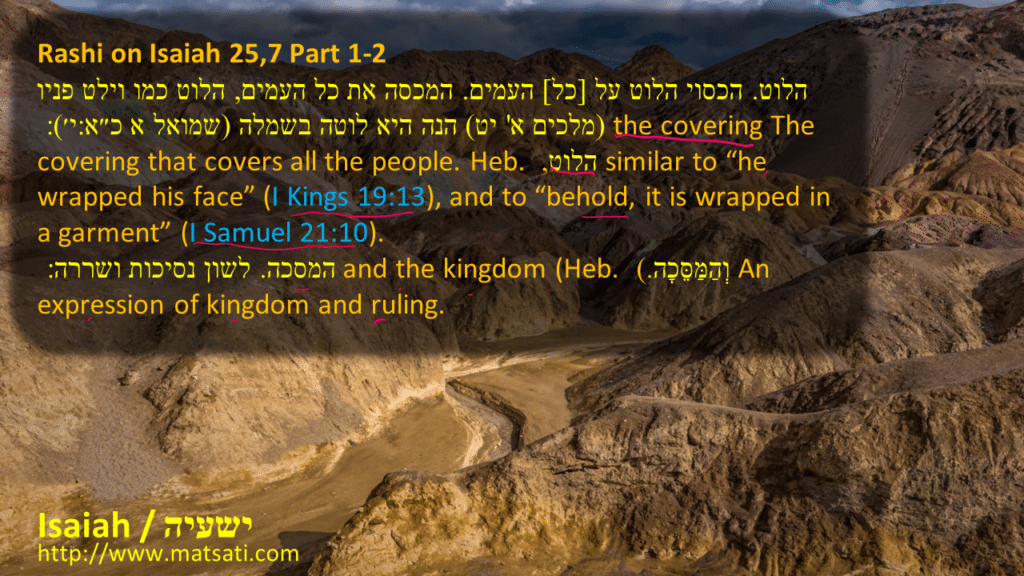
Rashi on Isaiah 25,7 Part 1-2
הלוט. הכסוי הלוט על [כל] העמים. המכסה את כל העמים, הלוט כמו וילט פניו (מלכים א’ יט) הנה היא לוטה בשמלה (שמואל א כ״א:י׳): the covering The covering that covers all the people. Heb. הלוט, similar to “he wrapped his face” (I Kings 19:13), and to “behold, it is wrapped in a garment” (I Samuel 21:10). המסכה. לשון נסיכות ושררה: and the kingdom (Heb. וְהַמַּסֵּכָה.) An expression of kingdom and ruling.
Here Rashi speaks of the covering over all the people of the earth, and God removing that covering. It is interesting to note that the covering parallels the act of masking. Masking has traditionally played a very important role in occult rituals. Historically, the wearing of the mask over one’s mouth is a token of submission which is a gesture of one’s willingness to be subject to others who are not your usual sovereign. The Encyclopedia Britannica defines mask wearing as: “A form of disguise or concealment usually worn over or in front of the face to hide the identity of a person and by its own features to establish another being.” This is an occult description of transformation through the use of a mask, from one role to another. The wearing of the mask is simply part of the initiation ritual used to visually and psychologically signal that one has consented to this new arrangement. By wearing the mask, one is signaling his or her consent to accept a new and very different position in this world. This is exactly what was going on during the pandemic as masks do not prevent the transmission of airborne viral disease. This is why masking and social distancing never worked, and in fact it was the treatment protocols that actually led to the mass of deaths from C19. The point of mask wearing was to solidify in people’s minds, into the subconsciousness, this occult transformation that is not of God. In fact, this led to masses of people not trusting in God our Father in heaven for His protection, rather, many even today would rather trust in man and the strength of their flesh for their protection, and at the same time calling a curse down upon oneself in doing so. (See Jeremiah 17:5-10) We note how this is the point of the occult transformation, and the point of this covering that covers all the people discussed here in Isaiah 25:7. Can we see the occult parallels in the LGBTQ community, trans-, homosexual-, queer-, etc to those who masquarade as something they were not created to be? Can we see how this covering, this occult transformation, is part of the delusion of transhumanism, dystopia and dysphoria? The Evil One is working very hard to normalize these things into daily life, making these things appear to be common among the masses. This is the whole idea behind the masking of the mouth, to no longer be the person we used to be, to change our culture, to change what once was, towards something different, something that doesn’t trust in the Living God in heaven! We have to stand against this tyranny and occult devil worshiping practices! Stand for truth, and bear testimony of who God is as the Creator and Lord over all!
Isaiah goes on saying the following according to the TgJ, ח יִתנְשֹון מֹותָא לְעָלְמִין וְיִמחֵי יוי אְלֹהִים דִמעְתָא מֵעַל כָל אַפַיָא וְחִסוּדֵי עַמֵיה יַעדֵי מֵעַל כָל אַרעָא אְרֵי בְמֵימְרָא דַיוי גְזִיר כֵין׃ 25:8 Death shall be forgotten forever; and the Lord God shall wipe away tears from off all the faces, and the reproach of his people he shall remove from off all the earth, because it hath been decreed thus by the WORD of the Lord. (TgJ) What we are reading here is related to the restoration of the world, and even to that of death being swallowed up, forgotten forever. The Zohar interprets these things in the following way:

Zohar 1:124a:4
The phrase “between you and the woman” refers to “the woman who fears Hashem” (Mishlei 31:30), (i.e. Malchut). The words “and between your seed” refer to the rest of the heathen nations; “and her seed”, namely Yisrael. “He shall bruise your head” is a reference to the Holy One, blessed be He, who will remove the serpent from the world, as it is written, “He will destroy death forever” (Isaiah 25:8) and “also I will cause…the unclean spirit to pass out of the land” (Zecharyah 13:2).
Zohar 1:127a:1
Every defiled spirit, is attached to and comes to the world from the serpent and no one in this world is safe from it, because it is everywhere, until the time when the Holy One, blessed be He, will remove it from the world, as it is written, “He will destroy death for ever” (Isaiah 25:8) and “I will also cause…the unclean spirit to pass out of the land” (Zecharyah 13:2).
Zohar 1:131a:8
Rabbi Elazar and Rabbi Yesa were sitting one night, studying Torah. Rabbi Elazar said, Come and behold, In the future, when the Holy One, blessed be He, resurrects the dead, all the souls that will be aroused before Him will stand before Him in the very shape they had in this world. And the Holy One, blessed be He, will bring them down to other bodies and call them by name, as written, “He calls them all by names” (Isaiah 40:26). Each soul will enter its place in the body and be properly revived in the world. Then, the world will be perfected. Of that time it is written, “And the disgrace of his people shall He take away” (Isaiah 25:8). What is “the disgrace of his people shall He take away”? It is the Evil Inclination which darkens the faces of the people and rules over them.
We note here that the Zohar draws out the idea of when death is swallowed up, that God will destroy death forever. This is consistent with what we read in the book of Revelation at the consummation of days, which states, Revelation 20:14 “and death and hell were cast into the lake of fire, this is the second death.” The Zohar quotes from Zechariah 13:2 stating, “also I will cause…the unclean spirit to pass out of the land.” We see the extent of the work of these unclean spirits today in the world manifest in the LGBTQ community. The Encyclopedia Britannica on ritual mask wearing continues saying the following that parallels these things, “The person who wears the mask is also considered to be in direct association with the mask’s spirit force and is consequently exposed to personal danger of being affected by it …Upon donning the mask, the wearer sometimes undergoes a psychic change, and, as in a trance, assumes the spirit character depicted by the mask.” Based upon these things, is there any doubt or wonder why everywhere Yeshua went while here on Earth he cast out demons and unclean spirits? Zohar goes on describing the authority structure of the spiritual world, that these unclean spirits come from the serpent, the Evil One. The way that God defeats death is through resurrection. All of those things which led to sin, the thoughts and intents of the heart and the Yetzer Hara (Evil inclination). The Talmud Bavli discusses this verse in the following way:
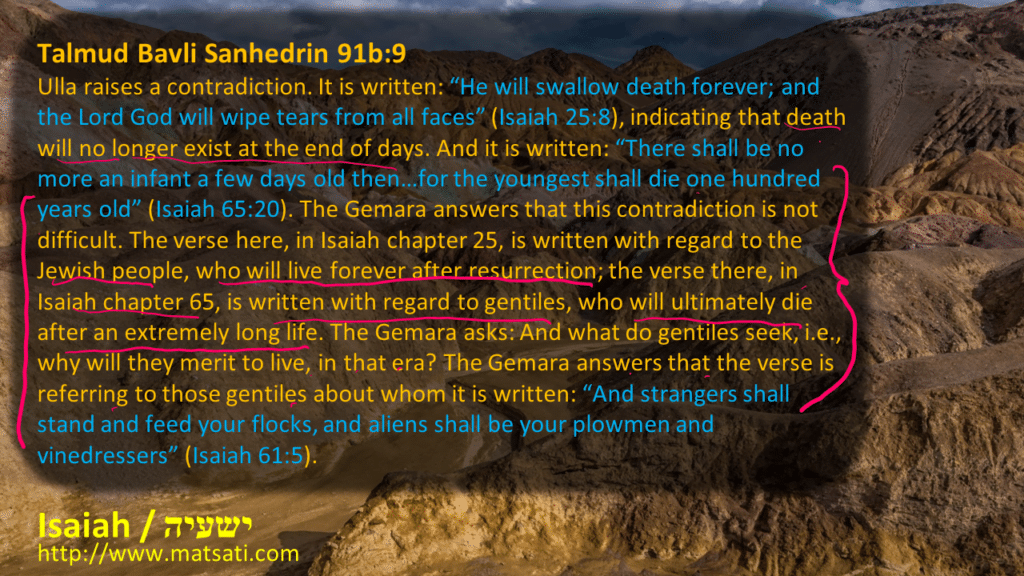
Talmud Bavli Sanhedrin 91b:9
Ulla raises a contradiction. It is written: “He will swallow death forever; and the Lord God will wipe tears from all faces” (Isaiah 25:8), indicating that death will no longer exist at the end of days. And it is written: “There shall be no more an infant a few days old then…for the youngest shall die one hundred years old” (Isaiah 65:20). The Gemara answers that this contradiction is not difficult. The verse here, in Isaiah chapter 25, is written with regard to the Jewish people, who will live forever after resurrection; the verse there, in Isaiah chapter 65, is written with regard to gentiles, who will ultimately die after an extremely long life. The Gemara asks: And what do gentiles seek, i.e., why will they merit to live, in that era? The Gemara answers that the verse is referring to those gentiles about whom it is written: “And strangers shall stand and feed your flocks, and aliens shall be your plowmen and vinedressers” (Isaiah 61:5).
The interpretation of death being swallowed up, and God wiping the tears away, is found in the resurrection and in the lengthening of days. Now the Gemara speaks of the gentiles not living forever, but only living a long life. If death was swallowed up forever, the non-Jew would also live forever. It may be that the “gentile” referred to is one who rejects the ways of God, but in this context serves Israel and so merits extended life. This still does not seem consistent with a time of no death and no tears. Something must be done with those who do not love the Lord, and this is the place that is prepared for those who do not love the Lord or His holy and righteous ways. We note the following Torah references to having a long life.
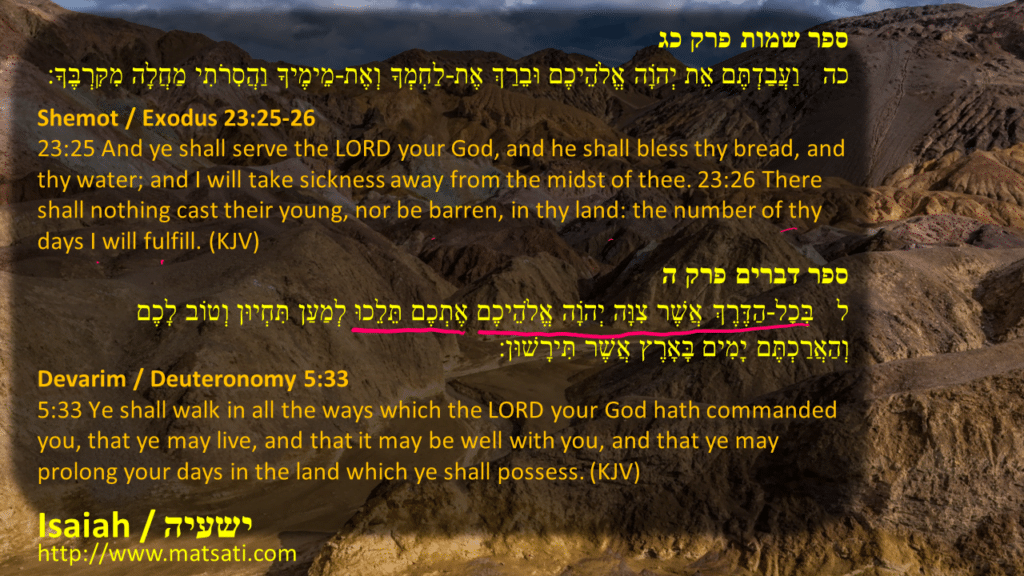
ספר שמות פרק כג
כה וַעֲבַדְתֶּם אֵת יְהוָֹה אֱלֹהֵיכֶם וּבֵרַךְ אֶת-לַחְמְךָ וְאֶת-מֵימֶיךָ וַהֲסִרֹתִי מַחֲלָה מִקִּרְבֶּךָ:
Shemot / Exodus 23:25-26
23:25 And ye shall serve the LORD your God, and he shall bless thy bread, and thy water; and I will take sickness away from the midst of thee. 23:26 There shall nothing cast their young, nor be barren, in thy land: the number of thy days I will fulfill. (KJV)
ספר דברים פרק ה
ל בְּכָל-הַדֶּרֶךְ אֲשֶׁר צִוָּה יְהוָֹה אֱלֹהֵיכֶם אֶתְכֶם תֵּלֵכוּ לְמַעַן תִּחְיוּן וְטוֹב לָכֶם וְהַאֲרַכְתֶּם יָמִים בָּאָרֶץ אֲשֶׁר תִּירָשׁוּן:
Devarim / Deuteronomy 5:33
5:33 Ye shall walk in all the ways which the LORD your God hath commanded you, that ye may live, and that it may be well with you, and that ye may prolong your days in the land which ye shall possess. (KJV)
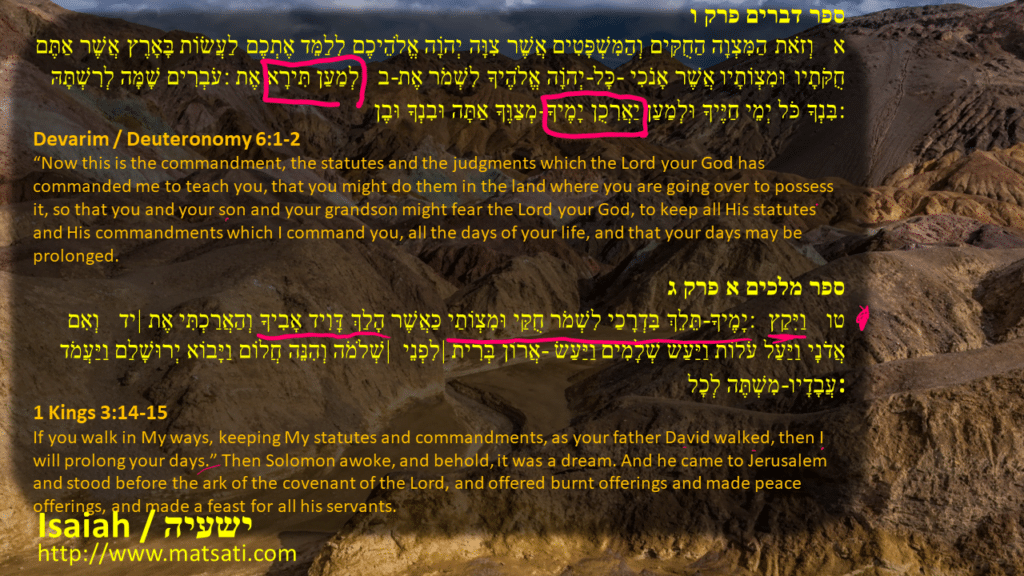
ספר דברים פרק ו
א וְזֹאת הַמִּצְוָה הַחֻקִּים וְהַמִּשְׁפָּטִים אֲשֶׁר צִוָּה יְהוָֹה אֱלֹהֵיכֶם לְלַמֵּד אֶתְכֶם לַעֲשֹוֹת בָּאָרֶץ אֲשֶׁר אַתֶּם עֹבְרִים שָׁמָּה לְרִשְׁתָּהּ: ב לְמַעַן תִּירָא אֶת-יְהוָֹה אֱלֹהֶיךָ לִשְׁמֹר אֶת-כָּל-חֻקֹּתָיו וּמִצְוֹתָיו אֲשֶׁר אָנֹכִי מְצַוֶּךָ אַתָּה וּבִנְךָ וּבֶן-בִּנְךָ כֹּל יְמֵי חַיֶּיךָ וּלְמַעַן יַאֲרִכֻן יָמֶיךָ:
Devarim / Deuteronomy 6:1-2
“Now this is the commandment, the statutes and the judgments which the Lord your God has commanded me to teach you, that you might do them in the land where you are going over to possess it, so that you and your son and your grandson might fear the Lord your God, to keep all His statutes and His commandments which I command you, all the days of your life, and that your days may be prolonged.
ספר מלכים א פרק ג
יד וְאִם | תֵּלֵךְ בִּדְרָכַי לִשְׁמֹר חֻקַּי וּמִצְוֹתַי כַּאֲשֶׁר הָלַךְ דָּוִיד אָבִיךָ וְהַאֲרַכְתִּי אֶת-יָמֶיךָ: טו וַיִּקַץ שְׁלֹמֹה וְהִנֵּה חֲלוֹם וַיָּבוֹא יְרוּשָׁלַם וַיַּעֲמֹד | לִפְנֵי | אֲרוֹן בְּרִית-אֲדֹנָי וַיַּעַל עֹלוֹת וַיַּעַשֹ שְׁלָמִים וַיַּעַשֹ מִשְׁתֶּה לְכָל-עֲבָדָיו:
1 Kings 3:14-15
If you walk in My ways, keeping My statutes and commandments, as your father David walked, then I will prolong your days.” Then Solomon awoke, and behold, it was a dream. And he came to Jerusalem and stood before the ark of the covenant of the Lord, and offered burnt offerings and made peace offerings, and made a feast for all his servants.
Here in these three verses (Shemot / Exodus 23:25-26, Devarim / Deuteronomy 5:33, 6:1-2) we are told that listening to the Lord is equivalent to obeying His commands, and consequently the Blessing of God will pour down from heaven. Applying God’s word to our lives will lead to our children also fearing the Lord and applying His word to their lives as well. In the book of the Kings of Israel, we read the Lord speaking to Solomon about his father David, and to take the example of his father. The idea is that “this will prolong your days” is a fundamental truth since sin destroys life, righteousness preserves life! This is why we are told over and over again that seeking the Lord God Almighty and His holy ways leads to life. These truths are drawn out in Paul’s words according to Romans 6:23, For the wages of sin is death, but the free gift of God is eternal life in Christ Jesus our Lord. (KJV) Our salvation is a gift, and time is provided through the grace of God to repent from sin. The Shema then instructs us on what we should be doing, to love the Lord God Almighty with all of our mind, strength, and soul. The implication is to walk in God’s ways of truth and righteousness, to seek Him daily, and how these things express our love for Him!
Isaiah goes on in the TgJ saying the following, ט וְיֵימַר בְעִדָנָא הַהוּא הָא אְלָהַנָא דֵין דְסַבַרנָא לֵיה וְיִפרְקִינַנָא דֵין יוי דַהְוֵינָא מְסַבְרִין לְמֵימְרֵיה נְבוּעַ וְנִחדֵי בְפוּרקָנֵיה׃ 25:9 And one shall say at that time: Behold, this is our God; this is he for whom we have hoped, and he shall save us: this is the Lord, for His WORD we have hoped; we will rejoice and be glad in his salvation. י אְרֵי תִתגְלֵי גְבוּרְתָא דַיוי בְטוּרָא הָדֵין וְיִתְדָשוּן מֹואְבָאֵי בְאַתרְהֹון כְמָא דְמִתְדָש תִבנָא בְטִינָא׃ 25:10 For the power of the Lord of hosts shall be revealed in this mountain; and the Moabites shall be trodden under foot even as straw is in the clay. יא וְיַפרֵיש מַחַת גְבוּרְתֵיה בֵינֵיהֹון כְמָא דִמפָרֵיש שַייָטָא לִמשָט וְיַמאֵיך יְקַרֵיה עִם אָשְוָת יְדֹוהִי׃ 25:11 And he shall extend the stroke of his power among them, as the swimmer extends himself to swim; and he shall humble his glory, together with the wiles of his hands. יב וּכרַך תְקֹוף כַרכֵי עַמְמַיָא יְמַגַר יִרמֵי יִמטֵי לְאַרעָא עַד עַפרָא׃ 25:12 He shall cast down the fortified city, the great city; he shall thrust it down, it shall come to the earth, even to the dust. (TgJ) The TgJ ties in the importance of God’s Word and the hope that is generated through reading about the Lord and how He loves the faithful. Isaiah 25:10 speaks of the mountain of Zion and recalls the prophecy of Isaiah 2:1-5, of the glory of God and His salvation. The wicked will be cast down, even though they may feel they have the upper hand, their time is limited, and they too are given plenty of time to repent and turn from their wicked ways. The commentary Kedushat Levi states the following concerning these verses:
Kedushat Levi, Genesis, Vayera 29
Genesis 21,25. “Avraham rebuked Avimelech on account of the well, etc.” Avimelech rejected the accusation, claiming he had not known about what his servants had done.Normally, we have a rule that when a tzaddik engages in rebuking someone, he points out that the trespass committed by the wicked concerned was a sin against G’d and His Torah. In this instance, Avraham accused Avimelech of having committed a wrong when it had been his servants who had stolen the water from Avraham. He reminded Avimelech that G’d created the world, and that He gave us laws by which to conduct ourselves, and that robbery was definitely forbidden. The person violating G’d’s law receives a warning in the form of the tzaddik rebuking him. The letters in the words uttered by the tzaddik when he rebukes the sinner light up in the face of the guilty party, thus affording him an opportunity to immediately do penance. One of the names of G’d is: מי, as we know when Pharaoh challenged Moses by saying: מי ה’? This is what Avimelech meant when he said to Avraham לא ידעתי מי עשה את הדבר הזה, “I do not know of this מי who has done this;” i.e. “I have never heard of a Creator who has created the universe, hence I do not know of a prohibition to steal or rob.” Another one of G’d’s names is the word זה, as we know from Exodus 15,2 זה א-לי ואנוהו, “זה is my G’d and I will glorify Him.” We also find the word as a reference to one of G’d’s names when Isaiah 25,9 said זה ה’ קוינו לו, “we have been hoping for the Lord זה.” Avimelech tells Avraham that he had heard of all this theology only from the mouth of Avraham, he had never previously been informed of this. He adds that even now he has not heard or “seen” the letters that make up the alphabet of the Torah from Avraham’s mouth, i.e. גם אתה לא הגדת לי. The word הגדת, derived from גד, is similar to גד גדוד יגודנה in Genesis 49,19, where it refers to “good fortune,” similar to what Gad’s mother proclaimed בגד, viewing herself as having good fortune seeing that she had born 6 of the twelve tribes. (Genesis 30,11) The word is a simile for good fortune in the sense of מזל טוב. Avimelech had not yet seen the letters that would trigger his doing teshuvah for the wrongs he had been guilty of. The word אתה is an allusion to the letters from א to ת in the Hebrew alphabet, the letters of the Holy Tongue. When Avimelech adds: וגם אנכי לא שמעתי בלתי היום, “and I also have not heard about all this until this day,” he uses the word אנכי, the first word of the Ten Commandments with which God revealed Himself at Mount Sinai, as meaning that on this day God’s sovereignty was revealed to him, and he could now perceive these letters of the Holy Tongue. On that day Avimelech had learned from Avraham about three aspects of God, i.e. מי, זה, אנכי.
It is always interesting to observe how the Rabbis use גזרה שוה – Gezerah Shavah and בנין אב משני כתובים – Binyan av mishnai katuvim to build a teaching principle based upon a set of verses. (Bereshit / Genesis 49:19, 30:11, Shemot / Exodus 21:25, 15:2, Isaiah 25:9) The summary idea taken from the commentary is to that of the mystery of God, the mystery of His paths, found in these words מי זה “who is this” and how the nations, the kings of the nations depicted here in the commentary, do not know God. Paul wrote the following to Timothy according to 1 Timothy 3:14-16.
1 Timothy 3:14-16
3:14 These things write I unto thee, hoping to come unto thee shortly: 3:15 But if I tarry long, that thou mayest know how thou oughtest to behave thyself in the house of God, which is the church of the living God, the pillar and ground of the truth. 3:16 And without controversy great is the mystery of godliness: God was manifest in the flesh, justified in the Spirit, seen of angels, preached unto the Gentiles, believed on in the world, received up into glory. (KJV, ܗܳܠܷܝܢ ܟܴ݁ܬ݂ܷܒ݂ ܐ̱ܢܳܐ ܠܴܟ݂ ܆ ܟܱ݁ܕ݂ ܡܣܰܒܱ݁ܪ ܐ̱ܢܳܐ ܕ݁ܒ݂ܰܥܓ݂ܰܠ ܐܴܬ݂ܷܐ ܐ̱ܢܳܐ ܠܘܳܬ݂ܴܟ݂ ܂ܘܶܐܢ ܗܽܘ ܕܷ݁ܝܢ ܕ݁ܡܰܘܚܰܪ ܐ̱ܢܳܐ ܆ ܕ݁ܬ݂ܷܕܱ݁ܥ ܐܱܝܟܱ݁ܢܳܐ ܘܳܠܷܐ ܠܡܶܬ݂ܗܰܦܴ݁ܟ݂ܽܘ ܒ݁ܒ݂ܰܝܬܷ݁ܗ ܕܱ݁ܐܠܴܗܳܐ ܇ ܕܻ݁ܐܝܬ݂ܷܝܗ ܥܺܕ̱݁ܬܴ݁ܐ ܕܱ݁ܐܠܴܗܳܐ ܚܰܝܳܐ ܇ ܥܰܡܽܘܕ݂ܳܐ ܘܫܶܬ݂ܷܐܣܬ݂ܴܐ ܕܱ݁ܫܪܴܪܴܐ ܂ ܘܫܰܪܻܝܪܴܐܝܺܬ݂ ܪܱܒ݂ ܗܽܘ ܐ̱ܪܴܙܳܐ ܗܳܢܳܐ ܕ݁ܟ݂ܺܐܢܽܘܬ݂ܴܐ ܆ ܕܷ݁ܐܬ݂ܓ݁ܠܻܝ ܒܱ݁ܒ݂ܣܰܪ ܂ ܘܶܐܙܕܱ݁ܕܱ݁ܩ ܒ݁ܪܾܘܚ ܂ ܘܶܐܬ݂ܚܙܺܝ ܠܡܰܠܱܐܟ݂ܷ̈ܐ ܂ ܘܶܐܬ݂ܟ݁ܪܷܙ ܒܷ݁ܝܬ݂ ܥܰܡ̄ܡܷ̈ܐ ܂ ܘܶܐܬ݂ܗܰܝܡܰܢ ܒ݁ܥܳܠܡܳܐ ܂ ܘܶܐܣܬܱ݁ܠܱܩ ܒ݁ܫܽܘܒ݂ܚܳܐ ܀ Ταῦτά σοι γράφω ἐλπίζων ἐλθεῖν πρὸς σὲ ἐν τάχει· ἐὰν δὲ βραδύνω, ἵνα εἰδῇς πῶς δεῖ ἐν οἴκῳ θεοῦ ἀναστρέφεσθαι, ἥτις ἐστὶν ἐκκλησία θεοῦ ζῶντος, στῦλος καὶ ἑδραίωμα τῆς ἀληθείας. καὶ ὁμολογουμένως μέγα ἐστὶν τὸ τῆς εὐσεβείας μυστήριον· ὃς ἐφανερώθη ἐν σαρκί, ἐδικαιώθη ἐν πνεύματι, ὤφθη ἀγγέλοις, ἐκηρύχθη ἐν ἔθνεσιν, ἐπιστεύθη ἐν κόσμῳ, ἀνελήμφθη ἐν δόξῃ.)
The mystery is in this מי זה “who is this” God that calls out to us who has made us, created us, by simply the power of His Word. When Moshe approached God for the first time in Shemot / Exodus 3:5, we are told that he was afraid, hiding his face, because God was transcendent, holy, unapproachable, incomprehensible, powerful, and utterly glorious! This uneasiness is known as “Yirat HaShem” (יראת השם) “the fear of the Lord.” We read the following according to Devarim / Deuteronomy 10:20.
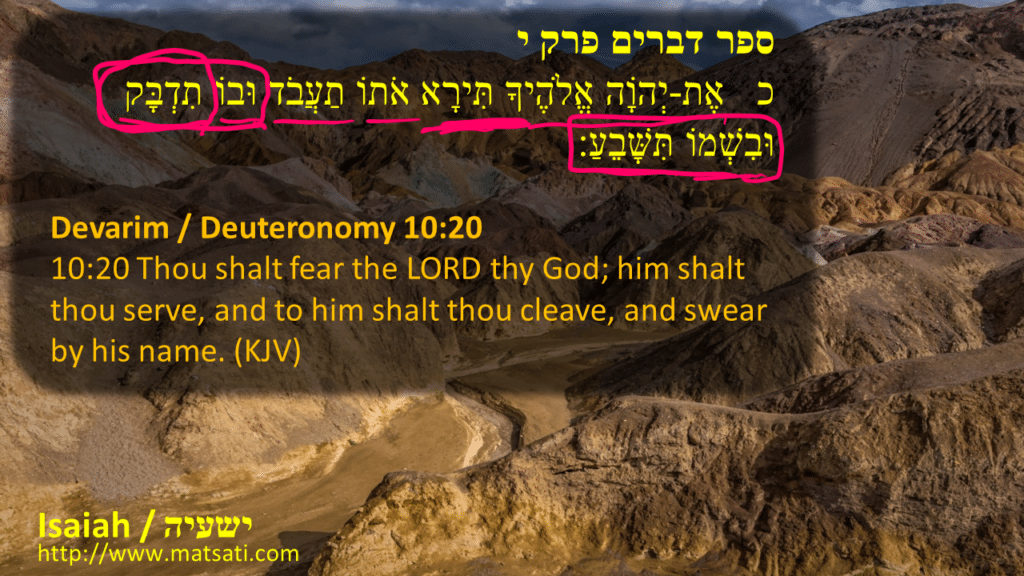
ספר דברים פרק י
כ אֶת-יְהוָֹה אֱלֹהֶיךָ תִּירָא אֹתוֹ תַעֲבֹד וּבוֹ תִדְבָּק וּבִשְׁמוֹ תִּשָּׁבֵעַ:
Devarim / Deuteronomy 10:20
10:20 Thou shalt fear the LORD thy God; him shalt thou serve, and to him shalt thou cleave, and swear by his name. (KJV)
Here we are called to וּבוֹ תִדְבָּק “in him cleave.” this principle of devakut (דבקות) is the blessedness of drawing close to the Lord, trusting in Him, and knowing Him in all of our ways. This means that we adopt the ways of God, we are actively applying God’s ways to our lives, as we walk and so He will walk with us. The mystery is found within these antithetical passages in the Scriptures, that speak to both fearing God and loving Him (Devarim / Deuteronomy 10:12, Tehillim / Psalms 2:11, Hebrews 10:31). This is the idea that God, who is infinitely holy, overwhelms that which is finite and sinful. Yet we have the desire to draw near to God, to cleave to Him, and to be made safe in His arms/hands. It is because of these things that God has given us His Torah (His holy instructions), His holy Words (all of the bible), so that we can relate to Him in a very practical way. In addition to this, He sent His Son Yeshua to show us the way. Yeshua the Messiah is our tender and loving Good Shepherd, we note this while John leaned against his chest, as a loving leader and friend. We note from the book of Revelation, that He (Yeshua) is the alpha and omega, the first and the last, the beginning and the end, he is the one whose eyes burn with blazing fire, and who bears the name of the salvation of God, the one whom the nations flee and dread. This is the power of God that is being described here in the TgJ according to Isaiah 25:9-12, of glory for His people, and of dread for the nations! When the Lord God passed by Moshe according to Shemot / Exodus 34:6-7, he heard the words “merciful and gracious, long-suffering, full of steadfast love, and willing to forgive all who trust in Him!” What a powerful testimony of God to His people! It is in this mercy and grace of God that connects us to Him as His people, and faith in Yeshua empowers us to live our lives for Him! All of the power and might of God, who is able to do anything, having unlimited abilities, He has revealed Himself to us in terms that we can genuinely understand, even in our finite incomplete knowledge of Him, we have His holy Words, and God reveals these things to us, as we read in Devarim / Deuteronomy 29:29 (הַ֨נִּסְתָּרֹ֔ת לַיהוָ֖ה אֱלֹהֵ֑ינוּ וְהַנִּגְלֹ֞ת לָ֤ׄנׄוּׄ וּׄלְׄבָׄנֵ֨ׄיׄנׄוּׄ֙ עַד־עֹולָ֔ם לַעֲשֹׂ֕ות אֶת־כָּל־דִּבְרֵ֖י הַתֹּורָ֥ה הַזֹּֽאת׃ 29:29 The secret things belong unto the LORD our God: but those things which are revealed belong unto us and to our children forever, that we may do all the words of this law. KJV) The message and the revelation of God to this finite world is found in His holy Word, of which are revealed to us who belong to the Lord! It is because of this our lives are surrounded by miracles, mysteries, and wonders all of which we do not understand. This is Paul’s reality, “And without controversy great is the mystery of godliness” and the reality of Isaiah as he prophesied to his people calling them to return to the Lord and to turn from their sinful ways. Faith sees the hidden mystery of God and celebrates the mercy of God in His love for us! Maimonides wrote of this saying “Torah is written in the language of men” which means that this world is connected to the world to come in a powerful way, through the word of God, by which the world itself was created! All praise and Glory go to the Lord! All of these things stand to testify that we need the Lord and His Messiah Yeshua!
